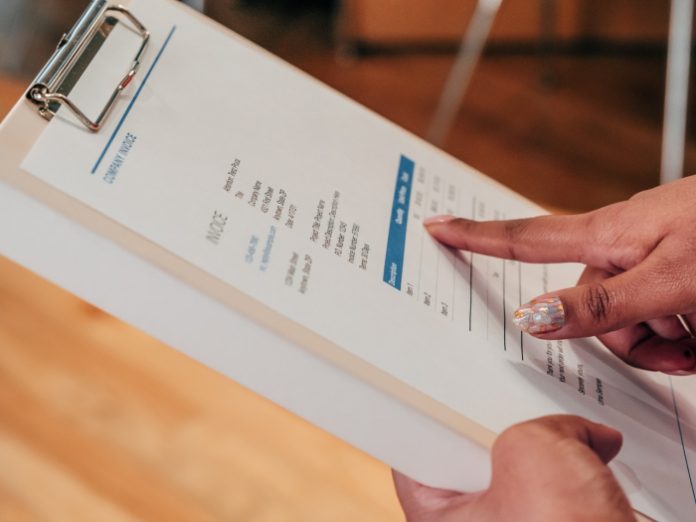Did you know that 82% of small businesses that fail do so because of cash-flow problems? Much of this problem comes down to ineffective payment options for daily business transactions.
If you’re running a home-based business, you need to find a professional means to bill and track payments for your products or services. That’s where using an invoice generator comes in. What is invoicing though?
Invoicing is a small-business’ best means of keeping track of what they’re owed. This allows you to expand your business and reduce disputes regarding customer payments.
What Is Invoicing?
An invoice is a document you send to customers to detail the payment due for products or services. This is used to keep a record of payments or to offer credit terms to customers. The invoice includes
- A detailed list and description of purchases
- Prices for each product or service
- Total amount due
- Due date and payment terms
- Contact info for payer and payee
- Descriptions of late fees and early payment incentives
- Invoice number
When you send the invoice, you set terms for the customer to make a payment. These terms can require immediate payment, or can give a 30, 60, or 90-day payment option.
Tips for Making an Invoice
An invoice needs complete and detailed information so customers know exactly what’s required from them. This means each section of the invoice should get included before sending it to the customer.
You should give clear instructions on how to pay the amount owed. Don’t leave customers in doubt on how they can make payments. You should also include an invoice number to each invoice so you can accurately track payments due and payments received for each customer.
You should also make sure all payment terms are clear. For example, if you’re using Net 30 terms, make sure the due date is clear. Also, consider offering incentives for early payment, and/or late fees for payments after the due date.
Why Are Invoices for Businesses Important?
Invoicing helps you keep track of all business transactions so there’s no question about how much you’re owed. They also allow you to offer credit terms to repeat customers or a customer waiting on finances.
The benefits of invoicing go beyond this though. With proper documentation and organization, invoices can keep you out of trouble in the future.
Invoices Help with Bookkeeping
Invoices, when done correctly, help you keep track of the money you have and the money you’re owed. This helps you keep accurate records.
Invoices make it easier to complete bookkeeping transactions. They also help you organize for filing taxes. Plus, a good invoicing system can help you with financial planning.
You can get an idea of when you receive payments and how much you receive at different times. This will help you plan for your purchases and investments. This also helps you make estimates for future fiscal years.
Invoices Add a Touch of Professionalism
As a home-based business, you’re fighting larger businesses for credibility in the market. Invoices can add a needed touch of professionalism to your business so customers take you seriously.
If you provide invoices like the bigger businesses, you establish yourself as an expert in the industry. This helps create trust around your business so you can compete.
Invoices Provide a Proof of Transaction
An invoice acts as proof that you have provided the products or services requested. This also proves you have the right to receive payment. This works best if you keep up with invoices and send them out immediately.
This proof of transaction proves helpful if you need to take legal action against a customer for lack of payment. Invoices also help prove you’ve completed your part of a transaction agreement in case of legal action from a customer.
Invoices Reduce Disputes
A completed invoice details all products or services provided and the amounts owed for each. This information leaves no doubt regarding what you charge and why.
This detailed information reduces customer questions about what they’re paying for. This also provides a trackable form to prove your amounts are above board.
Invoices Reduce Late and Non-Payments
When completing invoices, it’s important to make sure the information is easy to understand. If you ensure that all terms, total due, and due dates you ensure that customers know when they need to pay you.
You can also provide incentives for early payments or late fees to make customers more willing to pay their bills on time. Plus, the invoice numbers help you track and follow-up on payments owed. This helps reduce the chances that payments owed will fall through the cracks.
Invoices Help with IRS Audits
As a business, there’s always the possibility you’ll get audited by the IRS. These audits can prove time-consuming and stressful if you’re not prepared.
Invoices help you stay prepared for these IRS audits. Invoices act as evidence that you’ve reported all income. This reduces the chance of facing problems with your taxes, including costly actions filed against you.
Automate Invoices for Better Security
84% of small businesses rely on manual processes to keep up with daily business. While manual processes are cheaper than automation software, you have less ability to track your invoices and other transactions if you do it manually.
Automation software helps you create reminders for follow-up. It also helps you record transactions immediately so you don’t forget to update your records. Plus, automation software ensures you don’t lose records of payments.
By automating your invoices with your other accounting records, you can increase the benefits of providing invoices. Automation is especially helpful in reducing late or non-payment from customers.
Growing Your Home-Based Business
Growing your home-based business goes beyond answering the question “what is invoicing?” Finances are just one aspect of your business. You need to plan for every aspect of your business if you want to compete and build your company.
It helps to start with a good understanding of the accounting involved with your business. Do you have questions about accounting and bookkeeping? Check out more bookkeeping guides to become an accounting expert.
Find a Home-Based Business to Start-Up >>> Hundreds of Business Listings.

















































